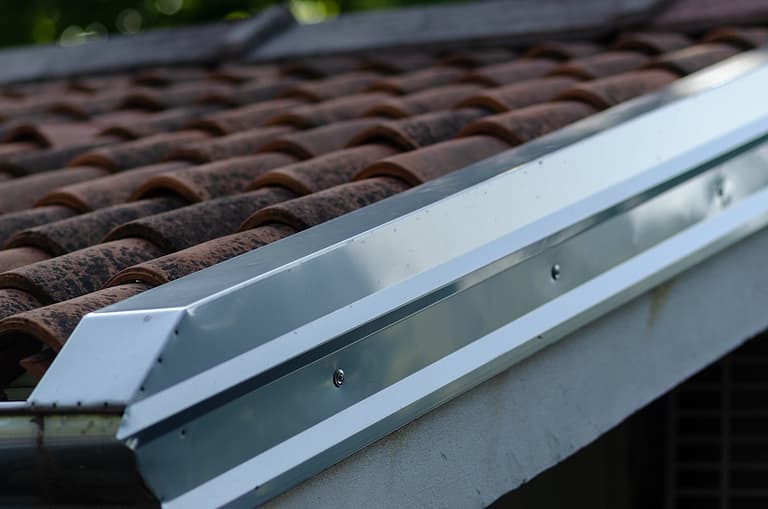A roof serves as the crown of a home, protecting it from the elements and maintaining structural integrity. However, over time, wear and tear can necessitate a roof replacement.
How to pay for a new roof? While this can be a significant investment, it’s crucial for the safety and longevity of your home. In this guide, we’ll explore:
- The signs indicating the need for a new roof
- The average cost of replacement
- Financing options available
- Essential maintenance tips to ensure your new roof stands the test of time
Signs You Need a New Roof
Not sure whether it’s time to bite the bullet and get that roof replacement? It can be hard to tell if you aren’t a professional. Luckily, we’ve gathered together all the most obvious signs, so that you can spot a damaged roof by yourself!
- Age: As a rule of thumb, if your roof is approaching 20-25 years old (depending on the material), it may be time for a replacement.
- Visible Damage: Look for missing, cracked, or curling shingles, as well as signs of mold, algae, or rot.
- Leaks: Water stains on ceilings or walls, as well as frequent leaks, indicate roofing issues that require immediate attention.
- Sagging: A sagging roofline suggests structural damage and calls for professional inspection.
- Energy Bills: A sudden increase in energy costs could indicate poor roof insulation or ventilation, signaling the need for replacement.
Average Cost of Roof Replacement
The cost of replacing a roof varies depending on factors such as the size of the roof, material chosen, and labor costs. On average, homeowners can expect to pay between $5,000 and $20,000 for a full roof replacement. Complex roofs with multiple angles or features may incur higher costs. It’s essential to obtain quotes from reputable roofing contractors to get an accurate estimate for your specific project.
What is Financing?
Financing refers to the process of obtaining funds to cover expenses or investments when one lacks the immediate capital to do so. It allows individuals or businesses to spread the cost of a purchase over time, making it more manageable within their budget constraints. Financing can take various forms, including loans, credit arrangements, or installment plans, and typically involves paying back the borrowed amount along with any applicable interest or fees. In the context of roofing, financing options provide homeowners with the means to pay for a new roof upfront while repaying the borrowed amount over time, thus enabling them to address roofing needs promptly without draining their savings.
Pros and Cons of Financing:
Financing offers a viable solution for homeowners who cannot afford to pay for a new roof upfront. Here are the pros and cons to consider:
✅ Pros:
- Immediate Solution: Financing allows you to replace your roof promptly, addressing any existing issues before they escalate.
- Flexible Payment Options: Financing offers flexibility in terms of repayment, allowing you to choose a plan that fits your budget.
- Preserves Savings: By spreading the cost over time, financing preserves your savings for emergencies or other investments.
❌ Cons:
- Interest Charges: Financing typically involves interest charges, increasing the overall cost of the project.
- Debt Obligation: Taking on financing means committing to monthly payments, which may impact your budget in the long run.
- Credit Requirements: Some financing options require a good credit score, which may limit eligibility for some homeowners.
4 Different Financing Options
When it comes to financing, you have plenty of options to choose from. Check out our list of the most popular financing options for homeowners looking to finance a new roof.
1) Personal Loans:
Offered by banks, credit unions, or online lenders, personal loans provide a lump sum with fixed interest rates and repayment terms.
2) Home Equity Loans:
These loans allow homeowners to borrow against the equity in their homes, offering lower interest rates but requiring collateral.
3) Roofing Company Financing:
Many roofing companies offer financing options, often in partnership with third-party lenders, with competitive rates and convenient application processes.
4) Credit Cards:
Using a credit card for roofing expenses provides flexibility but may come with high-interest rates if not paid off promptly.
How to Choose the Right Financing Option for You
With so many options, it can be tricky to decide which one fits with your personal goals. Consider these factors, when you are making a decision about financing:
- Assess Your Financial Situation: Consider your income, expenses, and existing debt obligations to determine how much you can afford to borrow.
- Research Options: Explore various financing options, comparing interest rates, terms, and fees to find the most suitable solution.
- Check Eligibility Requirements: Review the eligibility criteria for each financing option to ensure you meet the necessary qualifications.
- Read the Fine Print: Pay attention to the terms and conditions, including interest rates, repayment schedules, and any hidden fees.
- Seek Professional Advice: Consult with financial advisors or roofing professionals to gain insights into the best financing option for your specific needs.
How to Maintain Your New Roof
After investing in a new roof, you’ll want to make the most of it. Here are some simple steps to maintain your roof replacement:
Regular Inspections:
Schedule annual inspections to identify and address any potential issues before they escalate.
Clean Gutters:
Clear debris from gutters and downspouts regularly to prevent water buildup and potential damage to the roof.
Trim Trees:
Keep trees trimmed to prevent branches from rubbing against the roof and causing damage.
Address Repairs Promptly:
If you notice any signs of damage or leaks, address them promptly to prevent further deterioration.
Maintain Ventilation:
Ensure proper attic ventilation to prevent moisture buildup, which can lead to mold growth and roof damage.
Consult With Your Local Roofing Contractor
Investing in a new roof is a significant decision that requires careful consideration of financing options and ongoing maintenance. By understanding the signs indicating the need for a new roof, the average cost of replacement, financing options available, and essential maintenance tips, homeowners can make informed decisions to protect their homes and ensure the longevity of their investment. Whether through personal loans, home equity loans, or roofing company financing, financing options provide a pathway to a secure and durable roof that safeguards your home for years to come.
The best way to figure out what will work for you, is to talk with a professional who has seen it all. Contact G. Cannon Roofing today to get advice on your roof replacement.








